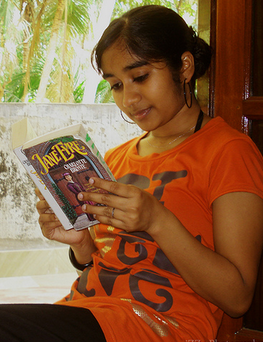|
I'm delighted to welcome novelist Susanna Bavin to my blog this week as a guest blogger. She's going to share her thoughts on the subject of reading as solace. Take it away, Susanna! How myths, legends and folk tales helped one young girl...  Image courtesy of Easa Shamih Image courtesy of Easa Shamih A while back, Maggie wrote a blog post covering the various reasons why people choose to read fiction. It was a lively and interesting post, but I felt there was one reason missing: reading for solace. So what does that mean? Obviously, it is closely linked to reading for escapism, but it is a specific type of escapist reading. According to the Concise OED my parents gave me one Christmas years ago, and which remains my favourite dictionary no matter how many more modern dictionaries have climbed onto the bookcase since, solace is: comfort in distress or discomfort or tedium. Now I must confess I didn't have tedium in mind when I read Maggie's blog. It was distress I was thinking of. So what is reading for solace? The best way to explain it is to give you an example. My dad died in his 60s, which came as a brutal shock to the family. Through that first week, I stayed with my mum. Understandably, she had trouble sleeping, but after the first couple of nights, she came downstairs in the morning and showed me a book. “This stopped me going mad,” she said. Was it a self-help book? A discussion of grief or widowhood? No, it was a novel. The book that had got my mum through the first endless nights was a story. I wish I could tell you what it was, but I can't. All I can tell you, based on my mum's reading habits, is that it was written by a woman (or by a man using a woman's name) and the plot was set at some point after the building of the railways. I seem to recall it was a contemporary novel, but I couldn't swear to it. Books can provide comfort in times of distress  I remember years ago reading an interview with Dick Francis, who described receiving a letter from a man who had lost a companion in a car accident. The accident happened in the middle of nowhere; no other vehicle was involved. The man walked until he found a phone box, then he returned to the car to await help, knowing his companion was dead. Assistance took a couple of hours to arrive and the man started to read a book that had belonged to his late companion – a Dick Francis novel. In the letter he subsequently wrote, he thanked Dick Francis for keeping his mind off a tragic situation. Another example that comes to mind is linked to the person who introduced me to the phrase reading for solace – a former boss of mine, the late Wendy Drewett, who for many years was the head of library services for children and schools in Buckinghamshire. There was nothing Mrs Drewett didn't know about children's and teenagers' books. She knew about authors, reading development, dyslexia, avid readers, reluctant readers... you name it. Above all, she knew about getting the right book to the right child at the right time. In the course of her career, she worked alongside many families, teachers and schools and it was from her that I first heard the words reading for solace in connection with children who live with a chronic condition that means they cannot lead an ordinary physical life. (Maybe there is an element of comfort in tedium here?) An example of this is the wonderful Rosemary Sutcliff, who suffered from juvenile arthritis from the age of two, which left her wheelchair-bound for the rest of her life. Although she famously didn't learn to read until she was nine (why bother when she had such a gifted storyteller for a mother?), she grew up on a diet of legends, myths and folk tales; and it was these, together with her ability to examine things close to her in minute detail, that occupied her mind and her imagination. Reading for solace? I don't imagine for one moment that Rosemary Sutcliff thought of it that way, any more than the reader of the Dick Francis novel did at the time – any more than my mother did at the time. I don't think it's something you do consciously. I think it's something that, in certain circumstances, simply happens; and you don't realise until afterwards. What do you think? And if the author of the book my mum read is reading this blog – thank you. Thank you, Susanna!  Susanna Bavin Susanna Bavin Many thanks to Susanna for a wonderful post. Susanna Bavin lives in North Wales and is an author of historical sagas. She also blogs fortnightly about books and writing. To relax she enjoys her garden, needlework and exploring the beauty of Llandudno. Susanna's latest, novel, The Sewing Room Girl, was published in November 2018. You can find out more from her website, www.susannabavin.co.uk, or connect with her on Twitter. Let us know what you think! Are there any books that have provided solace for you? Do you find comfort in reading when life gets tough? Leave a comment for us, and thank you!
0 Comments
Leave a Reply. |
Categories
All
Subscribe to my blog!
Via Goodreads
|
Join my Special Readers' group and receive a free copy of 'Blackwater Lake'!
|
Privacy policy Website terms and conditions of use
Copyright Maggie James 2018 - current date. All rights reserved.
Copyright Maggie James 2018 - current date. All rights reserved.
 RSS Feed
RSS Feed
